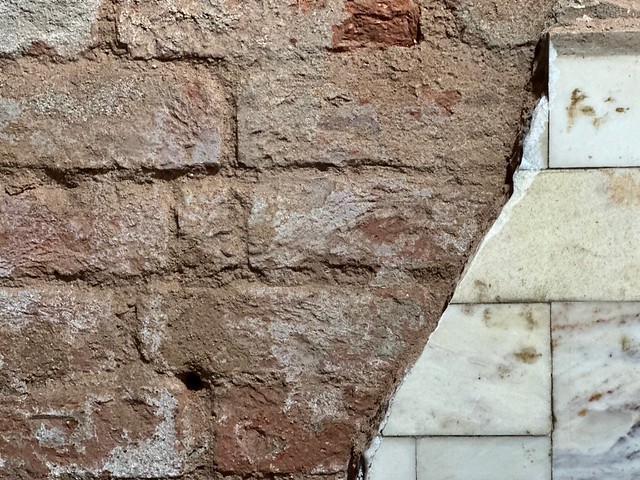
City Neighbourhood – Changing World, Haveli Azam Khan

Going with the wind, coming with the wind.
[Text and photos by Mayank Austen Soofi]
The stately sheesham door looked sufficiently venerable to be a tangible link to some unrecorded past.
It is gone, replaced by a metal shutter.
The next-door Saeed Hair Cutting Saloon is also gone, replaced by an eatery serving new-world dishes like pizza and pasta.
Haveli Azam Khan was chronicled on these pages weeks ago. Since then it has changed furiously, paralleling the superfast transformation undergoing in the entire Walled City. This makes one desperate to spend the waking hours strolling nonstop along the galis of the historic quarter, making a record of all the longtime establishments belonging to the button wale, the flower wale, the hakeem wale, the nihari wale, the ghodi wale, the bone-setter wale, the roti wale, the bartan wale, the achar wale, the printing press wale, the baraf wale, the kalai wale, the mehendi wale, the bakarkhani wale, the atta chakki wale, the sehra wale, the gur sherbet wale, the clock wale, the fen wale, the photo studio wale, the binding wale, and all the other wale. It also feels as urgent to document each of the old houses—their carved doors, their dalaan with fluted columns, their steep staircases, their sculpted balconies, their lakhori bricks. Plus, it all need to be done fast, before it gets too late. Everything in Old Delhi is dissolving and evolving right in front of the eyes. Suburb-style flats are mushrooming, along with gyms and eating joints. No certainty that things from the past that have survived to this day might last long.
Take this missing door. It opened to Rahman Ali’s machine-repair workshop he had inherited from his father. He sold the place to a footwear merchant. The new owner quickly got rid of the door.
The street’s ongoing alteration is most palpable at a circumcision clinic, opposite Delicious Omelet Corner, which was earlier Imamuddin’s pansari store. Set up 70 years ago by late Firoz Akhlaq, the clinic is run by his son and grandsons. Undergoing a renovation, the walls lie stripped of their marble tiles, revealing the raw bricks beneath. A handful of black granite tiles have been laid on the floor though.
A few steps ahead, shutters have been down for days at Modern Tea house, a favoured timepass stop for the local poets. Some say the attendant who administers it has gone to his village in Bihar. In any case, owner Khalil Bhai no longer comes to the establishment his father founded in 1967, while his young son is building an office-goer’s career outside the Walled City.
Amid the unstoppable transition, it is consoling to spot good old Maiku, the alley cat who walks stiffly with tail on high. At Naeem Bhai’s meat shop, she is snoozing under the chicken cages.
Dissolving and evolving
1.
2.
3.
4.
5.
6.
7.








Recent Comments